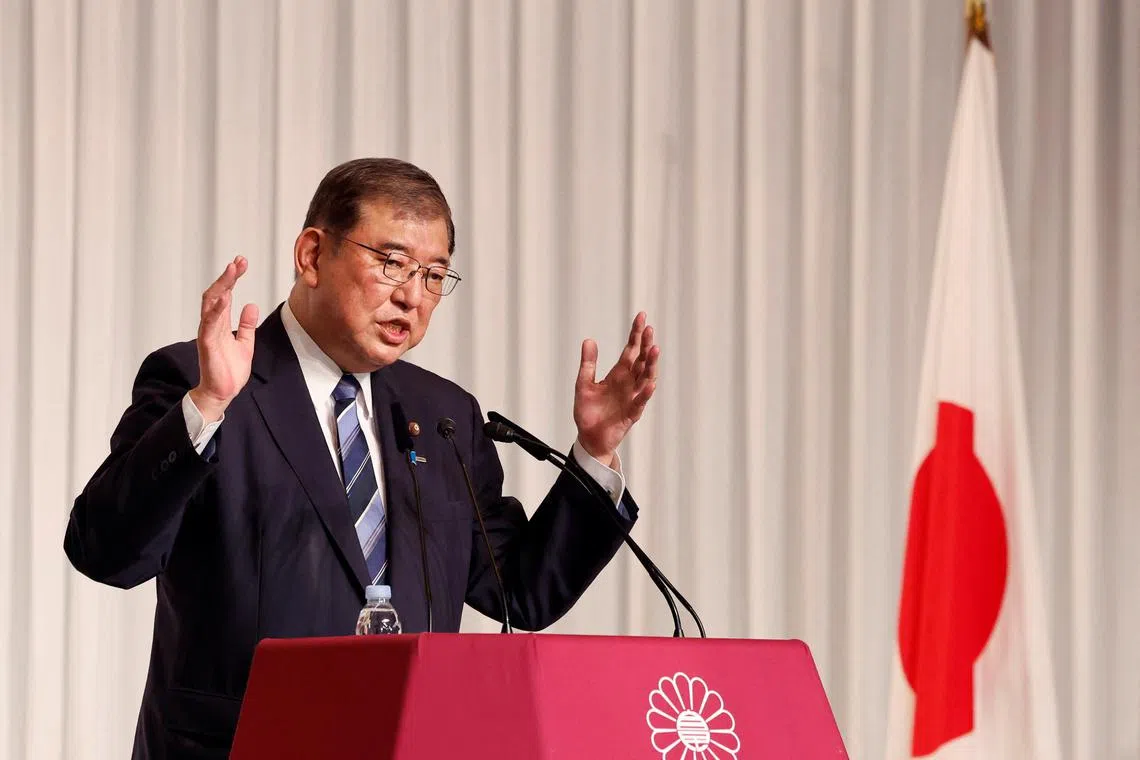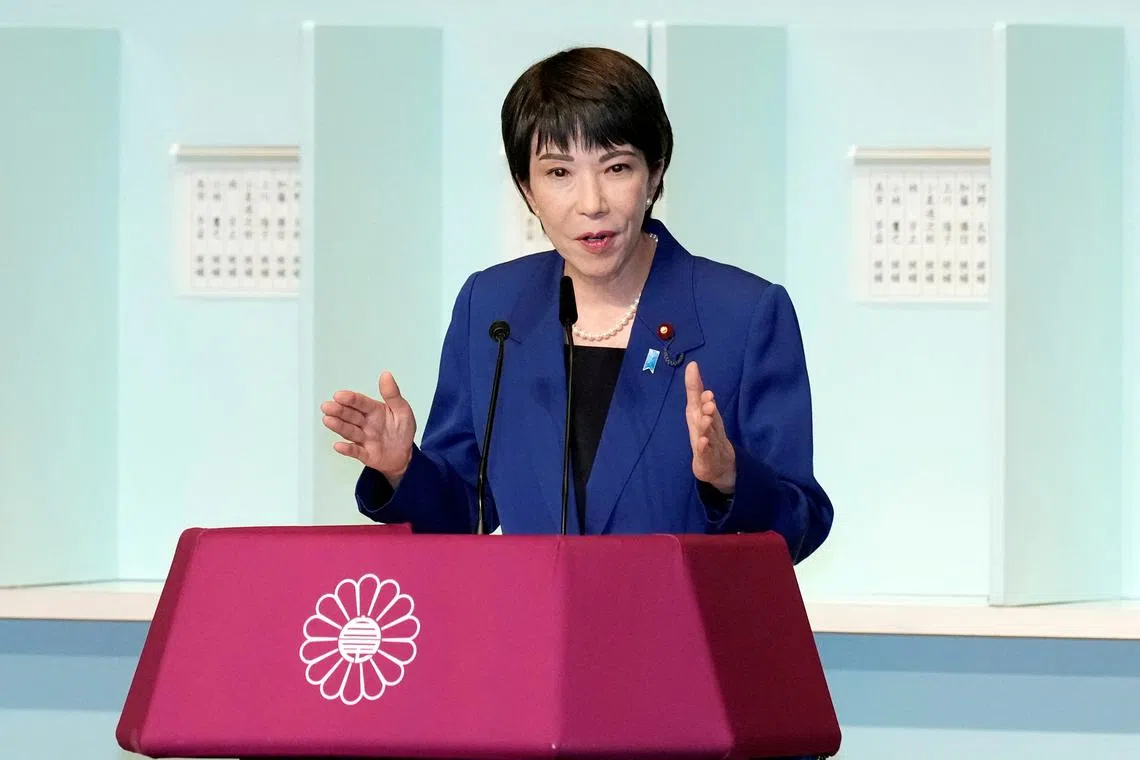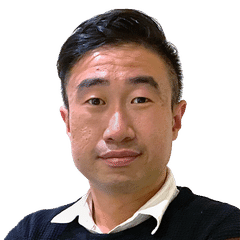Incoming Japan PM Shigeru Ishiba likely to stay the course on diplomacy despite rhetoric: Experts
Sign up now: Get insights on Asia's fast-moving developments

Mr Shigeru Ishiba, the newly elected leader of Japan's ruling Liberal Democratic Party, speaking at a press conference in Tokyo on Sept 27.
PHOTO: REUTERS
Follow topic:
TOKYO – Japan’s next prime minister Shigeru Ishiba spooked observers during the hustings in his bid to succeed Mr Fumio Kishida, with out-of-the-box ideas like the creation of an Asian version of the North Atlantic Treaty Organisation (Nato) military alliance.
But analysts believe the 67-year-old defence wonk, who was elected leader of the ruling Liberal Democratic Party (LDP) on Sept 27
Indeed, Mr Ishiba, a former defence minister, hinted that he was prepared to tone down his approach in a post-victory news conference, saying that “there is plenty of room for other options”.
He told reporters that the idea of an Asian version of Nato – the alliance comprising 30 European countries, Canada and the United States – was to ensure collective security at a time when US influence and presence in the region cannot be taken for granted.
“Japan is facing many security issues and our priority must be to protect our people,” he said, adding that his goal was to reinforce existing and overlapping defence partnerships and treaties in the region.
His idea of an Asian Nato has been roundly criticised
Mr Ishiba has also said that he would pursue a review of the Status Of Forces Agreement (Sofa) that covers US troops stationed in Japan, following a spate of violent crimes by US personnel in Okinawa. Another suggestion of his was to set up training bases for Japan’s Self-Defence Forces on US soil.
But senior fellow Tetsuo Kotani of the Japan Institute for International Affairs think-tank felt that Mr Ishiba will ultimately be bound by practical considerations.
For one thing, diplomacy takes two hands to clap, and Mr Ishiba would find it difficult to unilaterally chart a policy direction that does not have the buy-in of friendly countries.
Professor Kotani, who also teaches at Meikai University, further noted: “Given the security environment surrounding Japan, there will not be much room for him to manoeuvre other than to follow the existing trajectory to strengthen partnerships.
“I’m very sceptical that he will pursue those ideas – his aides also have traditional ideas towards foreign policy, and they will probably try to persuade him against that.”
Dr Sota Kato, a research director at The Tokyo Foundation for Policy Research think-tank, noted that Mr Ishiba had made an explicit promise to Mr Kishida that he would continue many of Mr Kishida’s policies as he viewed his predecessor’s achievements positively.
Whether this was only a ploy to win votes is anyone’s guess, but Dr Kato felt that it would be foolhardy for Mr Ishiba to refute Mr Kishida’s diplomatic and defence achievements.
He added that the new prime minister would likely continue to further strengthen Japan’s security by boosting defence spending and fostering closer partnerships.
Mr Ishiba has often cited Mr Kishida’s mantra that “Ukraine today may be East Asia tomorrow”, and believes that a Taiwan contingency would pose an existential crisis for Japan, given the proximity of its south-western islands to self-ruled Taiwan.
China views Taiwan as its territory and does not rule out taking it by force.
But experts were also of the view that Mr Ishiba, who angered Beijing when he led a six-member delegation to Taipei in August, would try to do more to stabilise Sino-Japanese ties that are at a nadir
Tensions are worsening after a Chinese military plane breached Japanese airspace for the first time on Aug 26, followed by the Sept 25 launch of a Chinese intercontinental ballistic missile into the Pacific Ocean. In response, Japan sent a warship through the Taiwan Strait for the first time since World War II, on Sept 25.
Meanwhile, amid fervent anti-Japanese sentiment in China, a Japanese schoolboy was fatally stabbed in Shenzhen while on his way to school on Sept 18, spooking the Japanese expatriate community there.
Dr Chen Yang, a visiting researcher at Liaoning University’s Institute of Japan Studies, believes that Mr Ishiba would likely want to start bilateral relations on the right footing. “He might value communication with China more by building mutual trust and resolving strategic differences through cooperation,” he said.
But he also saw a real risk that Japan would find it “difficult to be truly independent in its foreign policy” given its close security alliance with the US, which is caught up in an intensifying strategic competition with China.
“Overall, his foreign policy with China is expected to include more dialogue and communication, but (he) will continue to cooperate with the US in some areas to contain China,” Dr Chen said.
Nonetheless, Dr Koichi Nakano of Sophia University in Japan thinks that the US, China, Taiwan and South Korea are probably heaving a collective sigh of relief that Mr Ishiba has prevailed over his closest rival, Economic Security Minister Sanae Takaichi, 63.

Japan’s Economic Security Minister Sanae Takaichi speaking before the run-off election on Sept 27.
PHOTO: REUTERS
While she would have become Japan’s first woman prime minister, her staunch conservative credentials would also likely have upset the regional order, Dr Nakano said.
She had vowed to continue visiting the controversial symbol of Japan’s past military aggression, the Yasukuni Shrine, as prime minister, and is also in favour of arming Japan with nuclear weapons.
“Her victory would have stoked uncontrollable antagonism with China and potentially jeopardised the relationship with South Korea,” said Dr Nakano, now a visiting scholar at the Weatherhead programme on US-Japan relations at Harvard University.
But Mr Ishiba’s positions, including over the review of Sofa, could also frustrate Washington, he said.
“He is still more of a nationalist – he wants sovereign Japan to be a stronger and more equal partner to the US, but he might find it difficult to reach a consensus on how to get there.”
Additional reporting by Yew Lun Tian


